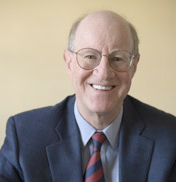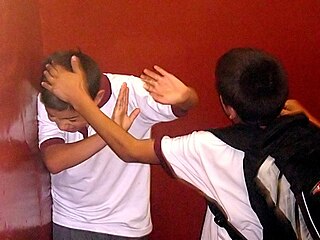Related Research Articles
Educational psychology is the branch of psychology concerned with the scientific study of human learning. The study of learning processes, from both cognitive and behavioral perspectives, allows researchers to understand individual differences in intelligence, cognitive development, affect, motivation, self-regulation, and self-concept, as well as their role in learning. The field of educational psychology relies heavily on quantitative methods, including testing and measurement, to enhance educational activities related to instructional design, classroom management, and assessment, which serve to facilitate learning processes in various educational settings across the lifespan.

A psychologist is a person who studies normal and abnormal mental states, perceptual, cognitive, emotional, and social processes and behavior by experimenting with, and observing, interpreting, and recording how individuals relate to one another and to their environments.
Lawrence Kohlberg was an American psychologist best known for his theory of stages of moral development.

Albert Bandura is a Canadian-American psychologist who is the David Starr Jordan Professor Emeritus of Social Science in Psychology at Stanford University.
Applied psychology is the use of psychological methods and findings of scientific psychology to solve practical problems of human and animal behavior and experience. Mental health, organizational psychology, business management, education, health, product design, ergonomics, and law are just a few of the areas that have been influenced by the application of psychological principles and findings. Some of the areas of applied psychology include clinical psychology, counseling psychology, evolutionary psychology, industrial and organizational psychology, legal psychology, neuropsychology, occupational health psychology, human factors, forensic psychology, engineering psychology, school psychology, sports psychology, traffic psychology, community psychology, and medical psychology. In addition, a number of specialized areas in the general field of psychology have applied branches. However, the lines between sub-branch specializations and major applied psychology categories are often blurred. For example, a human factors psychologist might use a cognitive psychology theory. This could be described as human factor psychology or as applied cognitive psychology.

Bullying is the use of force, coercion, or threat, to abuse, aggressively dominate or intimidate. The behavior is often repeated and habitual. One essential prerequisite is the perception of an imbalance of physical or social power. This imbalance distinguishes bullying from conflict. Bullying is a subcategory of aggressive behavior characterized by the following three criteria: (1) hostile intent, (2) imbalance of power, and (3) repetition over a period of time. Bullying is the activity of repeated, aggressive behavior intended to hurt another individual, physically, mentally, or emotionally.
School psychology is a field that applies principles of educational psychology, developmental psychology, clinical psychology, community psychology, and applied behavior analysis to meet children's and adolescents' behavioral health and learning needs in a collaborative manner with educators and parents. School psychologists are educated in psychology, child and adolescent development, child and adolescent psychopathology, education, family and parenting practices, learning theories, and personality theories. They are knowledgeable about effective instruction and effective schools. They are trained to carry out psychological testing and psychoeducational assessment, counseling, and consultation, and in the ethical, legal and administrative codes of their profession.

Teachers College, Columbia University (TC) is a graduate school of education, health, and psychology in New York City. Founded in 1887, it has served as the Faculty and Department of Education of Columbia University since its affiliation in 1898. Teachers College is the oldest and largest graduate school of education in the United States.
This is an index of education articles.

William Damon is a professor at Stanford University, director of the Stanford Center on Adolescence, and senior fellow at Stanford University's Hoover Institution. He is one of the world's leading scholars of human development. Damon has done pioneering research on the development of purpose in life and wrote the influential book The Path to Purpose. Damon has helped design innovative educational methods such as peer collaboration, project-based learning, and the youth charter. Damon also is known for his studies of purposeful philanthropy. His current work includes a study exploring student purpose in higher education and a study of family purpose across generations. Dr. Damon writes on intellectual and social development through the lifespan. He is the founding editor of New Directions for Child and Adolescent Development and editor-in-chief of The Handbook of Child Psychology.
Relational aggression or alternative aggression is a type of aggression in which harm is caused by damaging someone's relationships or social status.
Fielding Graduate University is a private university in Santa Barbara, California. It offers postgraduate and doctoral studies mainly in psychology, education, and organizational studies, primarily through distance education programs.

School bullying, like bullying outside the school context, refers to one or more perpetrators who have greater physical or social power than their victim and act aggressively toward their victim by verbal or physical means. This behavior is not a one-off episode; it must be repetitive and habitual to be considered bullying. Students who are gay, have parents of lower educational levels, are thought to be provocative, are perceived to be vulnerable, or are atypical or considered outsiders are at higher risk of being victimized by bullies. Baron (1977) defined such "aggressive behaviour as behaviour that is directed towards the goal of harming or injuring another living being who is motivated to avoid such treatment".
Peer victimization is the experience among children of being a target of the aggressive behavior of other children, who are not siblings and not necessarily age-mates.

Melanie Killen is a developmental psychologist and Professor of Human Development and Quantitative Methodology, and Professor of Psychology (Affiliate) at the University of Maryland, and Honorary Professor of Psychology at the University of Kent, Canterbury, UK. She is supported by funding from the National Institute of Child Health and Human Development (NICHD), and the National Science Foundation (NSF) for her research. In 2008, she was awarded Distinguished Scholar-Teacher by the Provost's office at the University of Maryland. She is the Director of the Social and Moral Development Lab at the University of Maryland.
School-Based Family Counseling (SBFC) is an integrated approach to mental health intervention that focuses on both school and family in order to help children overcome personal problems and succeed at school. SBFC is practiced by a wide variety of mental health professionals, including: psychologists, social workers, school counselors, psychiatrists, and marriage and family therapists, as well as special education teachers. What they all share in common is the belief that children who are struggling in school can be best helped by interventions that link family and school. SBFC is typically practiced at the school site, but may be based in a community mental health agency that works in close collaboration with schools.
Robert L. Selman is an American-born educational psychologist and perspective-taking theorist. who specializes in adolescent social development. He is married to Anne Selman and father to Jesse Selman and Matt Selman. He is the Roy E. Larsen Professor of Education and Human Development at the Harvard Graduate School of Education (HGSE) and a Professor of Psychology in Medicine at Harvard University. Robert Selman founded the Risk and Prevention masters program —at the Harvard Graduate School of Education in 1992,— and served as its first director through to 1999. Selman served as the chair of the Human Development and Psychology department at HGSE from 2000 to 2004. At the Harvard Medical School, he is professor of psychology in the Department of Psychiatry, where he serves as senior associate at the Judge Baker Children's Center and at the Department of Psychiatry at Children's Hospital Boston.
Merle Keitel is an American psychologist and academic and is currently the director of Training Counseling and Counseling Psychology in the Division of Psychological and Educational Services at the Fordham University Graduate School of Education.
Wendy Marion Craig is a Canadian clinical-developmental psychologist known for her research and advocacy in the field of childhood bullying. She is a professor in the Department of Psychology at Queen's University in Kingston, Ontario, Canada.

The most commonly used definition of school belonging comes from a 1993 academic article by researchers Carol Goodenow and Kathleen Grady, who describe school belonging as "the extent to which students feel personally accepted, respected, included, and supported by others in the school social environment." The construct of school belonging involves feeling connected with and attached to one's school. It also encompasses involvement and affiliation with one's school community. Conversely, students who do not feel a strong sense of belonging within their school environment are frequently described as being alienated or disaffected. There are a number of terms within educational research that are used interchangeably with school belonging, including school connectedness, school attachment, and school engagement.
References
- 1 2 3 "Shelley Hymel". ubc.ca. Retrieved November 27, 2016.
- 1 2 "Outstanding Education alumni recognized at special annual event". College of Education. Retrieved 2019-11-26.
- ↑ "Distinguished Alumni Award Winner, Shelley Hymel". Department of Educational and Counselling Psychology, and Special Education. 2015-03-16. Retrieved 2019-11-26.
- ↑ Holt, Melissa K.; Green, Jennifer Greif; Tsay-Vogel, Mina; Davidson, Joanna; Brown, Claire (2017). "Multidisciplinary Approaches to Research on Bullying in Adolescence". Adolescent Research Review. 2 (1): 1–10. doi: 10.1007/s40894-016-0041-0 . ISSN 2363-8346.
- ↑ "Bullying Research Network | College of Education and Human Sciences". cehs.unl.edu. Retrieved 2019-11-26.
- ↑ "2015 UBC Killam Research Prize Awarded to Dr. Shelley Hymel". Department of Educational and Counselling Psychology, and Special Education. 2016-02-03. Retrieved 2019-11-26.
| | This biography of a Canadian academic is a stub. You can help Wikipedia by expanding it. |